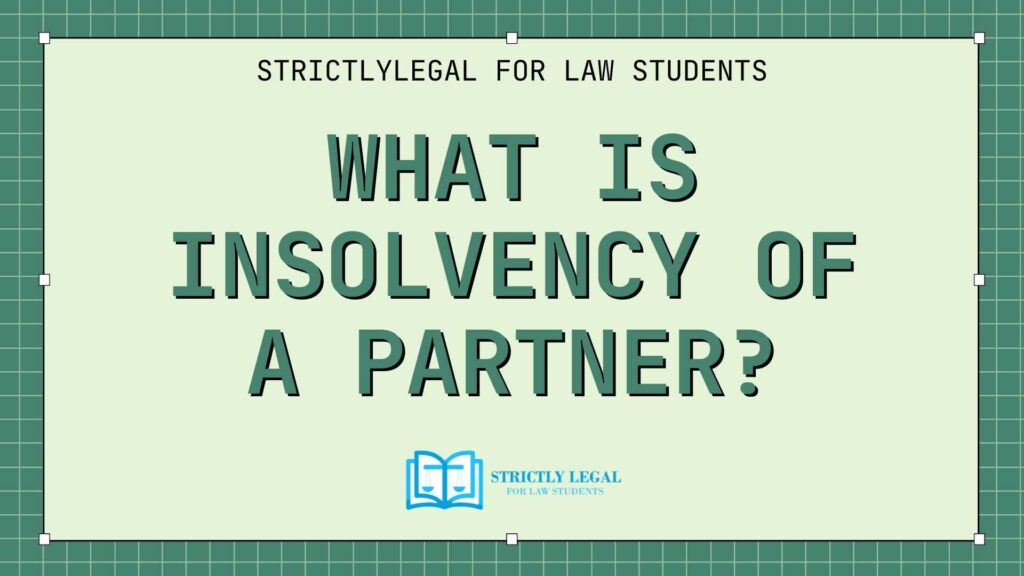In this article, we will discuss various topics like Introduction, retirement, expulsion, insolvency, and death of partners under section 31 to section 38 of the Indian Partnership Act, 1930. This post is a continuation of previous blogs on Partnership.
Few quick links to help you recapitulate the topic: Partnership.
Rights and Liabilities of a Minor in Partnership
Rights and Duties of Partners in Partnership
Partnership: Liability to third parties
Indian Partnership Act: Section 9 & 20-29
Table of Contents
Introduction of a new partner (Section 31):
As we have studied the earlier subject to a contract between partners and to the provisions regarding minors in a firm, no new partners can be introduced in a firm without the consent of all the existing partners.
The rights and liabilities of a new partner in an agreement of partnership ordinarily commence from the date when he is admitted as a partner unless he agrees to be liable for obligations incurred by the firm prior to that date.
The new firm, including the new partner who joins it, may agree to assume liability for the existing debts of the old firm, and creditors may agree to accept the new firm as their debtor and discharge the old partners.
The creditor’s consent is necessary in every case to make the transaction operative. Novation is the technical term in a contract for substituted liability, of course, not confined only to the case of a partnership.
But a mere agreement amongst partners cannot operate as novation. Thus an agreement between the partners and the incoming partner that shall be liable for existing debts will not ipso facto give creditors of the firm any right against him.
In case of a partnership between two partners, this section does not apply to a partnership of two partners which is automatically dissolved by the death of one of them In this event, there is no partnership at all for any new partner to be introduced into it without the consent of others.
Retirement of a partner(Section 32):
A partner may retire:
- With the consent of all the other partners:
- By virtue of an express agreement between the partners; or
- In the case of partnership at will by giving notice in writing to all other partners of his intention to retire.
Such a partner, however, continues to be liable to the third party for the acts of the firm after his retirement until public notice of his retirement is given either by himself or by other partners.
But the retired partner will not be liable to any third party if he latter deals with the firm without knowing that the former was a partner [Sub Sections (3) and (4)]. Right of outgoing partners.
An outgoing partner may carry on a business competing with that of the firm and he may advertise such business, but subject to contract to the contrary, he cannot use the name of the firm or represent himself as carrying on the business of the firm or solicit customers of the firm he has left (Section 36).
Although this provision has imposed some restrictions on the outgoing partners, it effectively permits him to carry on a business competing with that of the firm.
However, the partner may agree with his partners that on ceasing to be so, he will not carry on a business similar to that of the firm within a specified period or specified local limits.
Such an agreement will not be in restraint of trade if the restraint is reasonable Section 36(2).
A similar rule applies to such an agreement of the sale of the firm’s goodwill (Section 53(3)]
- On the retirement of a partner, he has the right to receive his share of the property of the firm, including goodwill It has been held that in the absence of evidence of any uniform usage to the contrary, the assets (property) should be taken at their fair value to the firm at the date of the account and not at their value as appearing in the partnership.
- An outgoing partner, where the continuing partners carry on the business of the firm with the property of the firm without any final settlement of accounts with him, is entitled to claim from the firm such share of profits made by the firm, since he ceased to be a partner, as attributable to the use of his share in the property of the firm in the alternative, he can claim interest at the rate of 6% per annum on the amount of his share in the property of the firm (Section 37)
- However, if by a contract between the partners an option has been given to the surviving or continuing partners to purchase the interest of the outgoing partner and the option is duly or his estate will not be entitled exercised, the outgoing partner is, on the other hand, any to any further share of partner who assumes to act in the exercise of the option does not material respects comply in all would be liable to account under the provisions contained in Para (a) above (provision to Sect to Liabilities of an outgoing partner we have already stated earlier, a retiring partner continues to be liable to the third party for acts of the firm after his retirement until the public notice of his retirement has been given either by himself or by any other partner.
But the retired partner will not be liable to any third party if the latter deals with the firm without knowing that the former was a partner (Section 32(3) and (4)
The liability of a retired partner to the third party continues until public notice of his retirement has been given.
As regards the liability for the acts of the firm done before his retirement the retiring partner remains liable for the same unless there as an agreement made by him with the third party concerned and the partners of the reconstituted firm.
Such an agreement may be implied by a course of dealings between the third party and reconstituted firm after he had knowledge of the retirement [Section 32(3)].
If the partnership is at will, the partner by giving notice in writing to all the other partners of his intention to retire will be deemed to be relived as a partner without giving public notice to this effect.
Expulsion of a partner (Section 33):
A partner may not be expelled from a firm by a majority of partners except in exercise, in good faith of powers conferred by a contract between the partners it is thus essential that:
(i) the power of expulsion must have existed in a contract between the partners,
(ii) the power has been exercised by a majority of the partners and,
(iii) It has been exercised in good faith If all these conditions are not present the expulsion is not deemed to be in ‘Bona Fida’ interest in the business of the firm
The test of good faith as required under Section 33(1) includes three things:
- That the expulsion must be in the interest of the partnership,
- That the partner to expelled is served with a notice,
- That he is given an opportunity of being heard.
If a partner is otherwise expelled, the expulsion is null and void. The only remedy when partner misconduct in the business of the firm is to seek judicial dissolution.
You should also note that under the Indian Partnership Act 1930, the expulsion of partners does not necessarily result in the dissolution of the firm.
The invalid expulsion of a partner does not put an end to the partnership even if the partnership is at will and it will be deemed to continue as before.
Example:
A, B, and C are partners in a partnership firm. They were carrying their business Successfully for the past several years.
Spouses of A and B fought in the Ladies Club on their personal issue and A’s wife was hurt badly. A got angry with the incident and convinced C to expel B from the partnership firm B was expelled from their partnership firm without any notice from A and B.
Considering the provisions of the Indian Partnership Act. 1932 state whether they can expel partner from the firm.
A partner may not be expelled from a film by the majority of partners except in exercise, in good faith of powers conferred by contract between the partners.
It is thus, essential that :
(i)the power of expulsion must have existed in a contract between the partners;
(ii) the power has been exercised by a majority of the partners; and
(iii) it has been exercised in good faith. If all these conditions are not present, the explosion is not deemed to be in the bona fide interest of the business of the firm.
The test of good faith as required under Section 33(1), Indian Partnership Act. 1932 includes things:
(a) That the expulsion must be in interest of the partnership,
(b) That the partner to expelled is served with a notice,
(c) That he is given an opportunity of being heard.
If a partner is otherwise expelled, the expulsion is null and void. Therefore, expulsion of partner B is not valid.
In this context, you should also remember that the provisions 32 (2), (3), and (4) which we have just discussed, will be equally applicable to an expelled partner as if he was a retired partner
Insolvency of Partner(Section 34):
When a partner in a firm is adjudicated an insolvent he ceases to be a partner on the date of the order of adjudication whether or not the firm is thereby dissolved.
His estate (which thereupon vests in the official assignee) ceases to be liable for any act of the firm done after the date of the order and the firm also is not liable for any actions of such a partner after such date (whether or not under a contract between the partners the firm is dissolved by such adjudication).
Effects of Insolvency
(a) The insolvent partner cannot continue as a partner
(b) He will cease to be a partner from the very date on which the order of adjudication is made.
(c) The estate of the insolvent partner is not liable for the acts of the firm done after the date of order of adjudication.
(d) The firm is also not liable for any act of the insolvent partner after the date of order of adjudication,
(e) Ordinarily, but not invariably, the insolvency of partner results in the dissolution of a firm; but the partners are competent to agree among themselves that the adjudication of a partner as an insolvent will not give rise to the dissolution of the firm
Death of Partner (Section 35):
Where under the contract a firm is not dissolved by the death of a partner, the estate of the deceased partner is not liable for the act. of the firm after his death.
Ordinarily, the effect of a death of a partner is the dissolution of the partnership, but the rule in regard to the dissolution of the partnership, by the death of a partner, is subject to a contract between the parties and the partners are competent to agree that the death of one will not have the effect will dissolving the partnership as regards the surviving partners unless the firm consists of only two partners.
In order that the estate of the deceased partner may be absolved from the liability for the future obligations of the firm, it is not necessary to give any notice either to the public or the persons having dealings with the firm.
In relation to Section 35, let us consider a concrete case X was a partner in a firm. The firm ordered goods in X’s lifetime, but the delivery of the goods was made after X’s death. In such a case, X’s estate would not be liable for the debt: a creditor can only have a personal decree against the surviving partners and a decree against the partnership assets in the hands of those partners.
A suit for goods sold and delivered would not lie against the representatives of the deceased partner. This is because there was no debt due in respect of the goods in X’s lifetime.
Revocation of continuing guarantee by changing in the firm (Section 38):
Section 38 of the Indian Partnership Act provides that a continuing guarantee given to a firm or to the third party in respect of the transaction of a firm is, in the absence of an agreement to the contrary, revoked as to future transactions from the date of any change in the constitution of the firm.
You should note that the above rule is subject to an agreement to the contrary. The agreement, if any, to the contrary required to displace the effect of Section 38, must be clear

Trying to learn the art of advocacy.
Practicing at the Calcutta High Court and in its vicinity.





